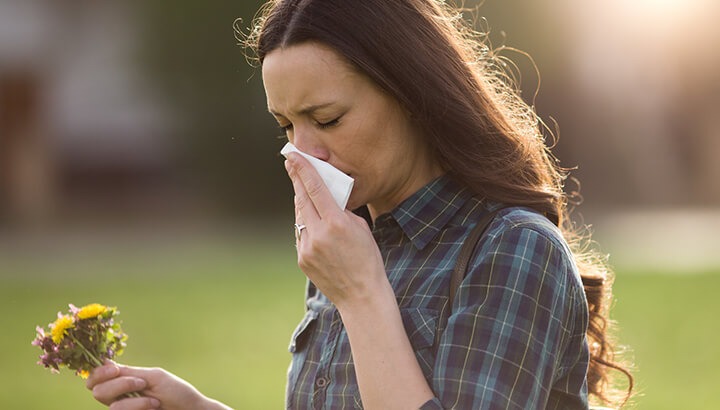Spring and summer bring many gifts. Flowers are blooming, honey bees are hard at work, and the warmer weather welcomes us to spend time outdoors. But there are unwanted gifts as well. The air is filled with pollen this time of year and many of my patients are stressed out and suffering from the wheezing and sneezing brought on by seasonal allergies.
What do stress and allergies have in common?
There’s little doubt that dealing with allergies can be stressful, but can stress precipitate allergies? That’s a question that has captured the interest of medical researchers recently, but before answering it, it’s worth pointing out that two have more in common than you may suppose.
Both stress reactions and allergic reactions involve a sort of over-reaction. Hay fever and seasonal sniffles result when the immune system goes haywire in response to an ordinarily harmless substance like tree pollen. And much of the damage that results from stress occurs because we are genetically prone to interpret and react to daily hassles as if they are life-threatening circumstances. Over-reaction is generally not a useful strategy.
How stress makes allergies worse
One practitioner trying to understand the relationship between allergies and stress is Dr. Ahmad Sedaghat, an ear, nose, and throat specialist at the Harvard-affiliated Massachusetts Eye and Ear Infirmary. According to Dr. Sedaghat, “Stress can make the allergic response worse. We don’t know why exactly, but we think stress hormones can ramp up the already exaggerated immune system response to allergens.”
Dr. Sedaghat suggests that there are two ways stress makes allergies worse:
- Psychological. If you are stressed out, it amplifies the allergy symptoms you are experiencing. This is when the mind-body connection can work against you.
- Physical. When stress hormones like cortisol are elevated, it puts an additional burden on the immune system which may result in overreaction and allergic responses.
I believe Dr. Sedaghat is on target because I have seen this play out first-hand many times. As a naturopathic physician, I’m a great believer that a comprehensive, holistic, patient-centered treatment plan does more than just address one specific ailment, but can improve a wide range of problems at once. When you address specific lifestyle factors — diet, physical activity, and stress management — you improve resilience and immunity more broadly.
High stress (and poor stress management) often plays a role in chronic medical problems, including allergies. People under stress become more vulnerable to specific allergic triggers (pet dander, ragweed, pollen, or dust mites) that act like the proverbial straw that breaks the camel’s back.
Increasing immune reserves to alleviate allergies
At the risk of introducing another metaphor, let me suggest that we can think of immunity as a bucket that can only hold so much. When the bucket fills up and flows over the top, that’s when a person becomes symptomatic. In this line of thinking, each allergen, stressor, or health challenge is like a drop of water that slowly add up and eventually fills up the bucket. Often, it is that final allergen exposure, which is like the last drop so to speak, which causes the symptoms to spill over.
Sticking with the bucket metaphor, there are two obvious ways that we can address the symptoms:
- Drain the bucket: This means limiting exposure to common allergens which can be done by practicing good allergy hygiene, avoiding known allergic triggers, using HEPA air filtration, doing saline nasal irrigation, and modifying your indoor environment (like replacing old carpeting, remediating any mold problems, using allergy-proof pillow and mattress covers) in order to keep your immediate environment allergy-free.
- Upgrade to a bigger bucket: This involves improving your general health and that of your immune system. You can do this by making lifestyle choices that boost immunity and counteract the effects of stress hormones like cortisol. These habits include eating well, doing more physical activity, losing weight if necessary, avoiding smoking and drinking, and getting adequate sleep.
Takeaway
As a physician-researcher Dr. Sedaghat is cautious with his conclusions. He says, “It’s not clear yet that stress reduction can directly reduce physical allergy symptoms, but there seems to be a mind-body connection when it comes to inflammatory diseases. So if you reduce stress, we would expect that stress hormone levels would go down, and the allergic overdrive to therefore go down as well.”
I generally agree…and I would go even further. When you take steps to improve health overall, you increase your body’s capacity to handle allergic triggers and other health challenges.
When the immune system is compromised (the overflowing bucket) by poor diet, stress, and lack of physical activity, allergic symptoms will be more frequent and more severe. So, next time you are wheezing and sneezing, don’t just blame the allergens, think about the ways you can improve your ability to tolerate them.
Take good care,
Dr. Josh









